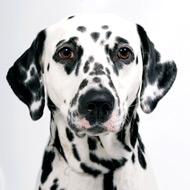
Kennel Club approves new testing programme for deafness in dalmations
A new health testing programme for Brainstem Auditory Evoked Response (BAER) testing for deafness in dalmatians has been approved by The Kennel Club.
Responsible dalmation breeders have been screening their litters for some time using BAER testing to ascertain the hearing status of the puppies in a litter. A number of specialist centres in the UK offer this screening, and each dog tested is issued with a certificate stating the dog's hearing status as: normal, unilateral hearing loss or bilateral hearing loss.
Working with the dalmation breed clubs, the Kennel Club has established an official BAER testing health programme for the breed, with the aim that individual testing centres will eventually forward the results directly to the Kennel Club.
The results will then be recorded on the tested dog's registration record, making them accessible to the public via their Health Test Results Finder.
Caroline Kisko, Kennel Club Secretary, said: “Responsible dalmatian breeders have been testing their dogs for years, and we are pleased to be able to offer a means of centralising the data obtained through this testing.
“The more results that are recorded, the clearer the picture will be as to the hearing status of Dalmatians in the UK. This can help owners to identify if their dog may need special care or training requirements and could help to develop tools to enable breeders make sensible breeding decisions in the future.”
The Kennel Club say that results for dogs tested, which meet the approved the programme criteria, can be recorded now. Owners are encouraged to submit copies of the certificates directly to the Kennel Club. For more information, email hbs@thekennelclub.org.uk.



 The latest
The latest